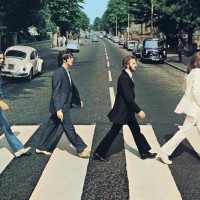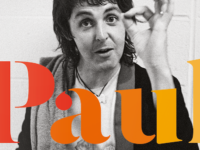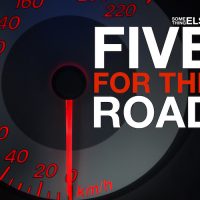by S. Victor Aaron
I was trying to get mentally prepared to actually describe a Charlie Hunter record when on a whim I decided to cue up GB’s The Other Side Of Abbey Road. That got me to thinking about Nick’s piece on the best Beatle remakes (hey Nick, I forgot one: Stevie Wonder’s sizzling 1970 version of “We Can Work It Out”) and then noticing that Idris Muhammed plays on this record made it all too much to not talk about. So here we are discussing Benson’s record instead.
If you’ve heard any Benson recordings produced by Creed Taylor, the sound of this set should be very familiar to you: plenty of room to show off those famous guitar chops, orchestration by Don Sebesky and a jaw dropping list of supporting musicians (Freddie Hubbard, Ron Carter, Herbie Hancock, Hubert Laws, Bob James, Sonny Fortune, Idris). Even the engineer is top drawer (Rudy Van Gelder). But what makes this record a bit more special than the other Creed/Benson albums is obviously the source of the material.
It wasn’t uncommon at all for Beatles songs to be covered by the time the Beatles themselves were on the verge of breakup, but Taylor and Benson went whole hog and devoted an entire album to one specific Beatles album. And, they commenced work on this project a mere 26 days after the original Abbey Road was released. In doing so, we get an interpretation unaffected by how history ultimately judged the record.
There were some other unusual facets to their approach, like making a mini medley to all but one of the five tracks; giving a total of ten compositions covered here. Furthermore, Benson sings on these tracks; that may not sound so strange today, but before Breezin’, his guitar playing was showcased much more; in fact this was his last that he sang on until that commercial breakthrough more than six years later.
“Golden Slumbers/You Never Give Me Your Money” starts the album off with a decidedly soft mood as Benson’s voice replicates the original almost perfectly before segueing into the second composition with his trademark soft octaves and later some pretty single note runs.
“Because” starts with Sebesky’s strings which makes a good fit for the tune, but is soon replaced by an extended funky groove centered around that signature bass line from “Come Together “. After the leader does what he does best and jams his funky ass off, Sonny Fortune follows with some equally hot blowing.
On “Oh Darling”, Benson simply can’t belt one out like Macca but makes a showcase for his more gentle playing and Sebesky’s big band jazz treatment recalls the Tenderly album recorded some two decades later.
“Here Comes The Sun” contains just George on vocals backed by strings, but is followed by “I Want You (She’s So Heavy”). Hubbard, well within the prime of his career, provides a fine solo.
The final track, “Something/Octopus’ Garden” is the weakest, with an uninspired vocal performance by GB on the first part and Sebasky’s big band rendering a generic, almost-Muzak rendering of “Octopus”. The last two minutes almost save the track when the tempo is speeded up and Benson provide some lightning fast lines.
The Other Side Of Abbey Road won’t rank among Benson’s best releases (that honor goes to Beyond The Blue Horizon from just a couple of years later), but it’s a fascinating experiment of sorts that mostly but not always worked. But whenever it didn’t, George Benson’s unmatched guitar could always be counted on to save the day.




